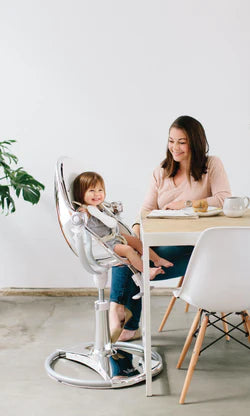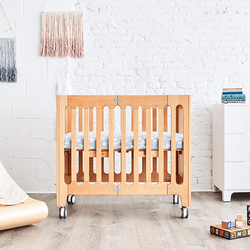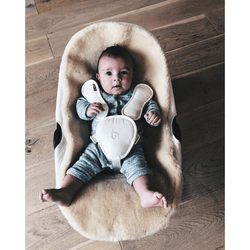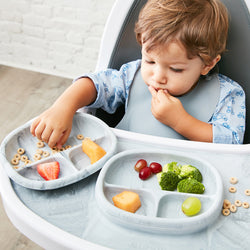
First foods are exciting…and also daunting. How do you know when to start them? Four months? Six months? We’ve heard everything in between. And fruits? Veggies? Rice? Fortunately, Dr. Anthony Porto is here to help. The pediatrician and pediatric gastroenterologist is also an associate professor at Yale University and Director, Pediatric Gastroenterology at Greenwich Hospital and is a wealth of feeding knowledge. He's also co-author of The Pediatrician's Guide to Feeding Babies and Toddlers: Practical Answers To Your Questions on Nutrition, Starting Solids, Allergies, Picky Eating, and More (For Parents, By Parents). Here, he outlines everything you need to know about the when, the what, and the how much (spoiler: It’s less than you think!). But always consult your pediatrician before starting solids!
What's your perspective on starting solids at 4 months? Are there some infants who can benefit from this?
Most full-term infants will be ready to start eating solids between four and six months. You will know that your child is ready to eat solids once they have good head control, are able to sit with some support, become unsatisfied after feeding, and give cues that they are finished feeding such as turning their heads when they are done.
I typically recommend that babies who are exclusively breastfed start solids at 6 months old, or as early as 4 months if they are showing interest while infants using formula may start as early as 4 months, if they are developmentally ready. Four to 6 months of age is also the right time for introduction of solids since it is not associated with an increased risk for allergies.
Occasionally, starting solids early, such as mixing cereal in your child’s bottle, may be recommended by your provider to help a child with gastroesophageal reflux. However, introduction of solids earlier than 4 months is not usually recommended and should be discussed with your pediatrician.
On the flip side, are there some babies who should wait until 6 months?
It really depends on your child’s readiness. Starting solids by six months is important because it helps with oral-motor development and nutrients in solid food also provides your baby with all the nutrition needed to ensure proper growth, including sufficient amounts of iron and zinc. The phrase, “food before one is just for fun” is cute, but not at all true.
YOU MIGHT ALSO LIKE: 7 ways to introduce your baby to spices
How do you know if you've started solids too early?
Starting solids before 4 months in a baby who isn’t developmentally ready can interfere with a baby getting all the adequate nutrition provided through breast milk or formula. A baby’s intestines may not be mature enough to handle solids earlier and early introduction to solids has been associated with increased of allergies and obesity. Developmentally, your child may just refuse the food by spitting it out of their mouth. A reflex known as the extrusion reflex, in which a baby pushes food out of his/ her mouth instead of swallowing the food diminishes at around 4 months so will still be present if solids are introduced earlier.
What's the right first food?
There is no right first food. In the United States, many pediatricians traditionally recommend starting with baby cereal. Other pediatricians will advise to start with fruits first since babies are naturally drawn to sweet foods, some will recommend vegetables first so babies won’t only gravitate toward sweet foods, and still other pediatricians recommend meats first for added iron and zinc. There is little evidence that the order for introducing solid foods matters! It is more important to offer a variety of fruits, vegetables, and meats in any order to get your baby used to different tastes. Since some foods tend to constipate babies while others have more of a laxative effect, it is also important to balance these foods as well.
Of note, rice cereal has been in the news due to the potential exposure to arsenic and I recommend limiting use to one serving a day emphasizing the importance of offering a variety of grains and food types in general.
During this 4-6 months period, should solids replace formula/breastmilk, or serve as an addition to it?
When you first introduce solids, your child will still drink the same amount of formula and breastmilk as the amount that they take in as the serving size per meal at 6 months is approximately 2 tablespoons (yes that’s it!). Go by your child’s cues and give more if it seems that they are tolerating more. Typically, we recommend starting with one solid meal per day for one month, then two meals for month and then by around 8-9 months your child will be eating 3 meals. Once your child gets the hang of solids and is eating more, they will naturally reduce the amount of milk they consume.
RELATED: 7 things every grandparent should know before their first sleepover
What's the number-one infant feeding issue you see?
I think there are a lot of ‘rules’ that exist that can be overwhelming for parents (it was certainly overwhelming to me!) and it can cause us to overthink what we should be doing. The most important thing is to have fun with solids. It will be messy but it’s important for your child to touch, play with and eat their first foods. Choose a variety of foods and start combo foods once your child has tolerated them individually. Give one new food for three to five days before moving on to the next new food. It is also helpful to give the new food in the morning, either before or about an hour after breast milk or formula, when babies are alert and eager to eat. Babies can also be more easily observed for any allergies during the daytime.
When it comes time to start feeding, choose a high chair that will make both baby and you comfortable. There are plenty of options, from the space-saving and foldable Nano to the modern multi-use, height-adjustable Fresco (which you can use from newborn days up until age 8!).
bloom fresco chrome highchair from bloom on Vimeo.







